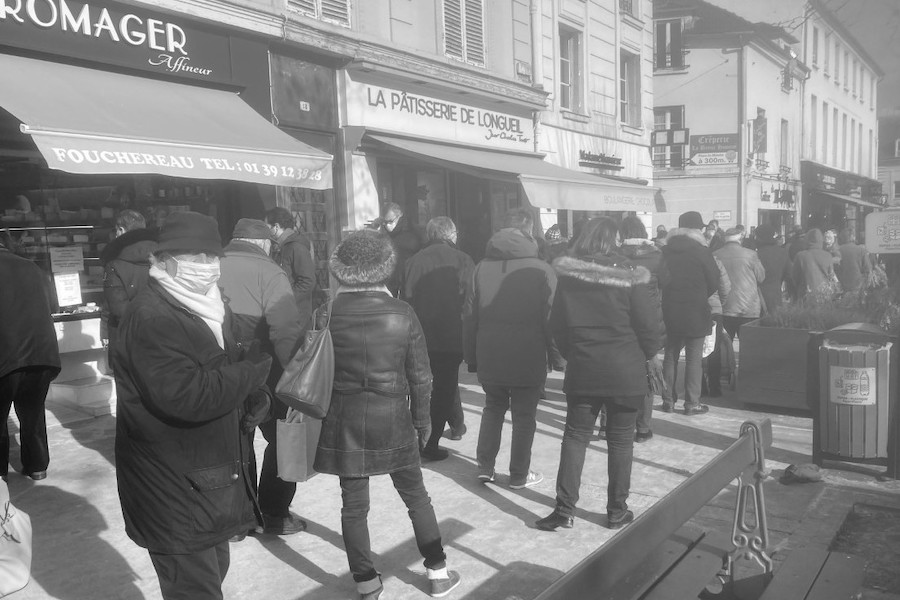Originally published February 2021.
The word of this extraordinary winter in Paris has been couvre-feu. The very expression is still heavy with associations from the 1940s occupation, even if the order to “cover your fires!” was originally intended to protect medieval wooden cities from burning down.
The mid-January tightening of France’s latest couvre-feu – to start at 6pm instead of 8pm – disrupted two important gastronomic rituals: the early evening baguette and the apéritif. Since a quarter of baguettes are normally baked after 6pm, the earlier curfew has created long bread lines after about 5pm. Giant boulangerie queues naturally defeat the very object of a curfew, creating a health risk similar to commuter trains now briefly packed between 5pm and 6pm The 6pm curfew is also intentionally targeting l’heure de l’apéro. Restricting convivial meetings over saucisson and sancerre has helped drive record viewings on French Netflix, in particular for Omar Sy’s excellent “Lupin”.
Our couvre-feu, however, is NOT a strict confinement. Schools and shops in the Paris area are (mostly) still open, but not restaurants, bars and cafés – except for limited takeaway services. Just off the Champs Elysées, traffic still flows past my Europa office but the pavements feel quiet. No waistcoated waiters from stylish brasseries serve creamy noisettes and no fresh fruits de mer are on ice outside elegant fish restaurants. Somehow central Paris has the subdued vibe of the city during a ‘normal’ month of August.
Since a quarter of baguettes are normally baked after 6pm, the earlier curfew has created long bread lines after about 5pm
It all feels like time is standing still. Life without landmarks means Parisians are increasingly living in the present and neglecting to plan ahead. The familiar landmark of a mid-February winter sport holiday is being disrupted by ski-lifts remaining closed. In France, as elsewhere, the extraordinary is becoming the ordinary. Economic news here is certainly out of the ordinary. There were a record LOW number of company liquidations in 2020 – proof that the government’s chomage partiel scheme is very effective – as well as record creation of new businesses created (two-thirds were low value micro-entreprises doing home deliveries). Despite these curious silver linings to covid, many virus-fatigued Parisians suspect we are simply in the eye of an economic storm.
In his regular Thursday evening covid updates the prime minister, Jean Castex, treads the now-familiar political tightrope between controlling health risk and keeping the economy ticking. Given that France has a May 2022 election and a formidable track record in street protest, President Macron must be anxious when placid Northern Europeans riot in Rotterdam to protest curfew.
The first few weeks of the post-Brexit period are also feeling a little out of the ordinary. More than one in three covid cases in France is now the contagious variant anglais mutation of the virus, and this is certainly having a contagious effect on nationalist instincts. Just imagine the power of the reverse situation in post-Brexit UK. Nigel Farage could make a ‘French variant’ into the new ‘French Pox’ of 16th-century Britain (syphilis!).
More than one in three covid cases in France is now the contagious variant anglais mutation of the virus, and this is certainly having a contagious effect on nationalist instincts
The M&S Food store at Gare St Lazare has fallen victim to another English variant – le Brexit. As fresh food deliveries from outside the EU are pending complex paperwork, most of the 21 M&S stores in Paris are empty of stock and empty of customers. The few shoppers I saw there swooped on packets of sea-salt crisps, one of the few things for sale at M&S. The deserted little store looked and felt strangely like shops in Communist East Germany in the 1980s…
By contrast, the nearby Carrefour City supermarket trades briskly with shelves full of saucisson and sancerre. Many French food retailers have just logged record years, with much of the normal trade from closed restaurants and bars funnelling towards Intermarché supermarkets and Carrefour hypermarkets.
Of course, consuming food and drink in France is NOT a functional event. Food here is more about sharing an experience, and a working lunch in front of a screen was even made illegal in France’s code de travail. The concept of la commensalité – sharing food with others around a table – really matters in a country where no less than 80% of meals are taken with others. In this disrupted winter, however, food is simply more functional. The good news is that most people here are still eating and drinking remarkably well.








